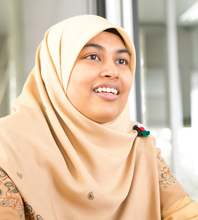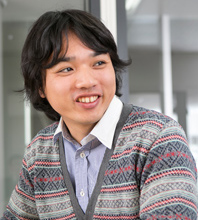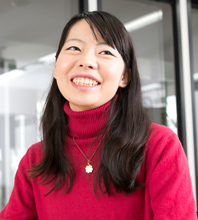Keio University’s Program for Leading Graduate Schools (2)
The two Programs for Leading Graduate Schools at Keio University are the Science for the Development of a Super Mature Society Program, which welcomes students from any of the 13 graduate schools, and the Global Environmental System Leaders Program (GESL), which is based on collaboration between the Graduate School of Media and Governance and the Graduate School of Science and Technology. Three members from the two programs gathered and talked about their programs for this group interview.
A desire for a wide perspective and knowledge beyond a specific field of expertise
Binti Mohamad Hashim is a member of the inaugural class of the Global Environmental System Leaders Program, which started in the school year of 2013. To start with, please tell us why you joined the program.

Iza Husna, Binti Mohamad Hashim, Second-year master’s program student, Graduate School of Science and Technology
Binti Mohamad Hashim: After transferring from a university in Malaysia to the third year of the Faculty of Science and Technology at Keio University, I proceeded to the Graduate School of Science and Technology. I major in mechanical engineering, and my research field is haptic technology. The research is about evaluating and creating data about the feel and touch of the hand when a person touches something, of which the results are applied to other fields.
As a matter of fact, I was also interested in environmental issues since high school, and wanted to learn about Japan’s leading knowledge and technology. Then I got to know about GESL. I joined this program, which aims at nurturing international leaders in environmental systems development, because I want to contribute to solving Malaysia’s environmental issues from a business standpoint in the future. It is really appealing because I can learn about management in the environmental field while continuing my studies on haptic technology at the Graduate School of Science and Technology.
Daisuke and Yuri are members of the inaugural class of the Science for the Development of a Super Mature Society Program, which started in the school year of 2012. Members can take advantage of the joint degree system and obtain two master’s degrees and a doctoral degree in five years. Students complete their first major’s master’s program within the first two years, then obtain their second major’s master’s degree in the next year, before finally completing their Phd in their first major in the final two years.
What made you join the program?

Daisuke Ando, First-year master’s program student, Graduate School of Business and Commerce
(Completed master’s program of the Graduate School of Science and Technology)

Yuri Yamamoto, First-year master’s program student, Graduate School of Medicine
(Completed master’s program of the Graduate School of Media and Governance)
Daisuke: My first major is computer science at the Graduate School of Science and Technology, and I am especially focusing on cloud storage. Since I was an undergraduate, I have wanted to start a venture business, and I got to know about the program just when I was having a hard time deciding whether to proceed on to the doctoral program after I complete my master’s program. At the program briefing, I heard about the need for Ph.D. graduates who can work on a global scale as leaders of the next generation. I decided to join the program as I felt that further training myself in the university’s academic environment before going out in the real world will enable me to contribute to society on a greater scale.
Yuri: Until last year, I belonged to the master’s program of the Graduate School of Media and Governance, and I studied intestinal bacteria at the Institute for Advanced Biosciences in Tsuruoka City, Yamagata Prefecture. At the same time, I am interested in health issues, especially preventive medicine, so I joined the Science for the Development of a Super Mature Society Program, seeking to find something linking bio and health. I wanted to learn how to utilize my research in order to benefit our society.
Apart from the first and second majors, classes of the program are held at Hiyoshi Campus, but since I was in Yamagata, I took advantage of the remote conference system to attend these classes. During the weekdays, I was able to manage, but as for the Saturday classes attendance at Hiyoshi Campus was compulsory, so every weekend I would take the overnight bus to go back and forth, and those days were really tough (laughs).
Daisuke: One of the features of this program is that you can receive an integrated education of arts and sciences. As I mentioned earlier, my first major is computer science, but starting my own business is my focus, so I am planning to study organizational theory at the Graduate School of Business and Commerce as my second major to learn about business and creating communities.
Natural science and social science have some things in common, but the differences are also quite significant. Since I am a science student, there is a lot to learn from the approach and way of thinking in social science. What’s attractive is that you can study a completely different field from what you have studied before - not just studying at your desk but actually stepping into the field.
In the case of Science for the Development of a Super Mature Society, isn’t it really tough to complete the master’s program for both the first and second major in just three years?
Daisuke: In my case, compared to just completing the master’s program of the Graduate School of Science and Technology, according to my calculation I need to obtain about 2.5 times more course credits.
Earning course credits isn’t the only challenge. For the last two years, I have been studying my first major at the Graduate School of Science and Technology, but to prepare for my second major studies at the Graduate School of Business and Commerce that starts this spring, I also participated in a seminar class of the Graduate School of Business and Commerce. I was really busy because of this. In addition, since I will go back to the Graduate School of Science and Technology next year for my doctoral program, this year, while studying business and commerce, I need to keep some presence in the laboratory of my first major. Obtaining two master’s degrees and a doctoral degree in five years is not easy. You need to brace yourself.
Yuri: Thanks to the tough program, I got trained to study and work efficiently. Compared to two years ago when the program started, I think I am much better with using my time. Starting from April, I will study methods of health-related policymaking as my second major in the master’s program of the Graduate School of Medicine. For example, the government is now promoting a policy called “Health Japan 21,” but in planning this policy, there must have been a lot of discussion based on a huge amount of evidence. This is not only the case in policymaking, but when you present a business proposal related to health, medical evidence is important and I will study how to gather, analyze and summarize such kind of evidence.
